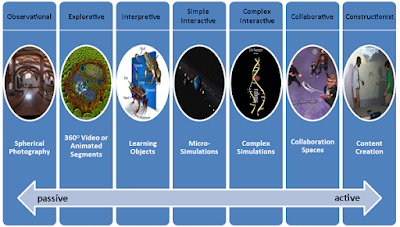As mentioned in last week's post, I recently developed a new and improved taxonomy, one specific to educational virtual reality content:
In this revised taxonomy (see this link to download a larger image), I added a content
category for collaborative virtual reality, i.e., the kind that enables
participants to meet together, explore together, or work together. This kind of
involvement transforms virtual reality into a shared rather than a solo
experience. (A solid example of this genre of virtual reality can be found in
the educational company, High Fidelity.) I also made an attempt to
differentiate between spherical photography and 360° video, which dominate the Google Cardboard
platform.
With an improved taxonomy in hand, I felt
much better. But what didn’t change, in my way of thinking, is the core
challenge: nearly all of the educational VR content I have seen to date still
slides only into the first three lanes: spherical photography, more passive 360° video or animations, or learning objects.
(Imagine simple walkthroughs, immersive field trips, and objects that can be
rotated.) Despite their immersiveness in a VR context, these learning
opportunities are all passive experiences. Yet hardly any VR content in today’s
educational marketplace reaches into the more interactive lanes of
micro-simulation, complex simulation, collaboration spaces, and user-generated
content. These latter lanes often work well addressing a ‘wicked’ challenge in
education today—the need to teach complex thinking and problem solving, not
just teach for memorization.

I just found this blog and have high hopes for it to continue. Keep up the great work, its hard to find good ones. I have added to my favorites. Thank You.
ReplyDeleteRealidade Virtual
Great blog it was. I found many things about virtual reality by this. virtual design and construction Calgary, Alberta also providing amazing service to their clients. Virtual reality is a new technique to find structure problems. This is so amazing.
ReplyDelete